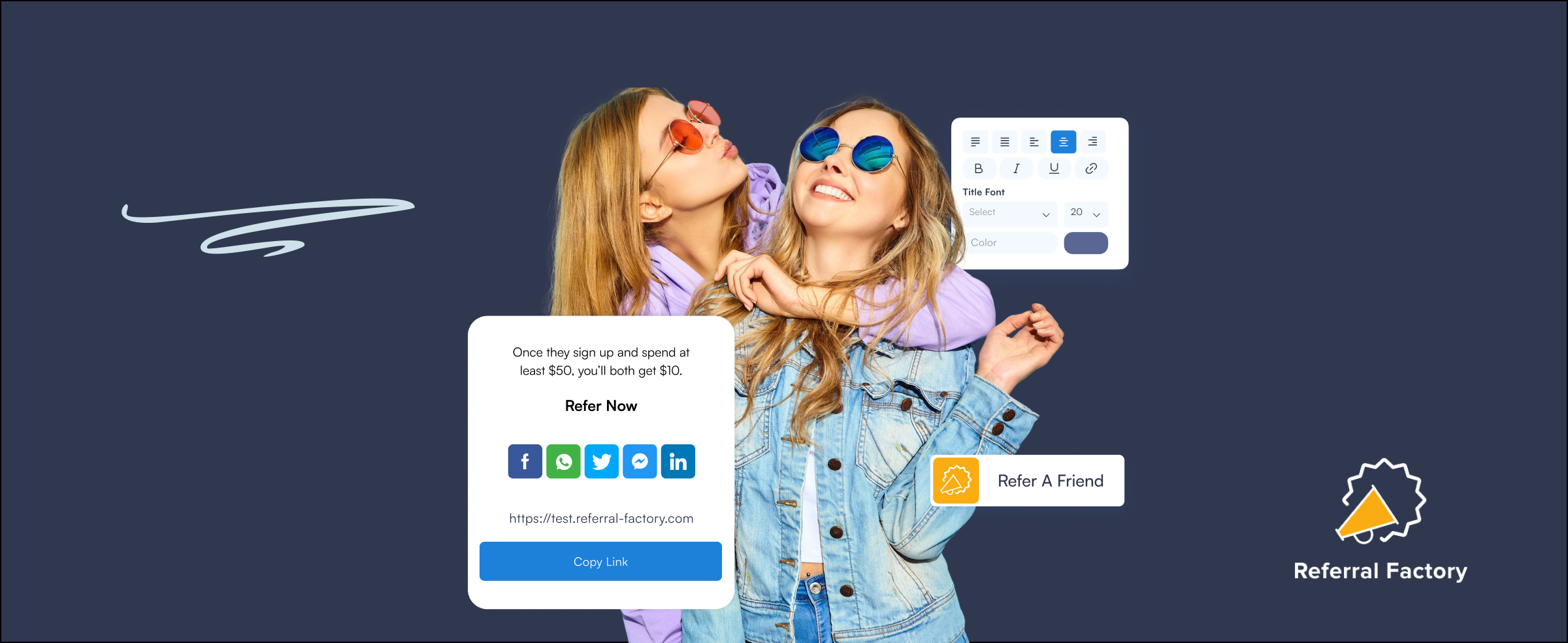Business Referrals: Why Every Business Should Have a Referral Program
Word-of-mouth recommendations have always been an effective marketing tool, and in today’s digital age, where trust has been eroded, they are more critical than ever.
Referral programs are a smart way to encourage people to promote your business through word of mouth and can be incredibly cost-effective.
When existing clients or customers recommend your business to their friends or family, it boosts your revenue and enhances your reputation.
A referral program is a structured approach to generating and tracking referrals, and it can be tailored to suit your business brand requirements and needs. One of the most significant advantages of a referral program is that it allows you to leverage your existing customer base.
Happy customers are more likely to recommend your business to others, and this kind of word-of-mouth advertising is a powerful tool for any business.
Referral programs reward customers for their efforts, which can translate into even more referrals and long-term customer loyalty. By incentivizing referrals, you are creating a mutually beneficial relationship with your customers, which can help build a strong sense of trust and rapport between you and your clients.
But referrals don’t just appear out of thin air. Like gold, you have to do a little digging to hit pay-dirt.
That’s where business referral programs come in.

The biggest tech companies of our decade have used referral programs to grow – Dropbox, PayPal, Uber, and more. Now, we’re seeing referral programs explode into all industry verticals. And since then it’s become easier than ever for businesses of all kinds and sizes to run their own referral programs using plug-and-play referral program software.
Here’s something crazy: one “in-person impression” (a friend talking up your product to another friend) is 4x more impactful than an online, paid impression.
This means that when my mom tells me about this fantastic new product she found, I’m 4x more responsive to her than the ads I saw online searching for the same product.
The problem is that referrals don’t fall into your lap from the sky. You have to take the steps to build a referral program and then encourage your customers to refer new business to you.
Key Takeaways
- Customer satisfaction is the foundation of successful business referrals.
- Exceptional customer service drives satisfied clients to advocate for your business.
- Satisfied clients form the backbone of thriving referral marketing strategies.
- Referral programs build customer loyalty and business success.
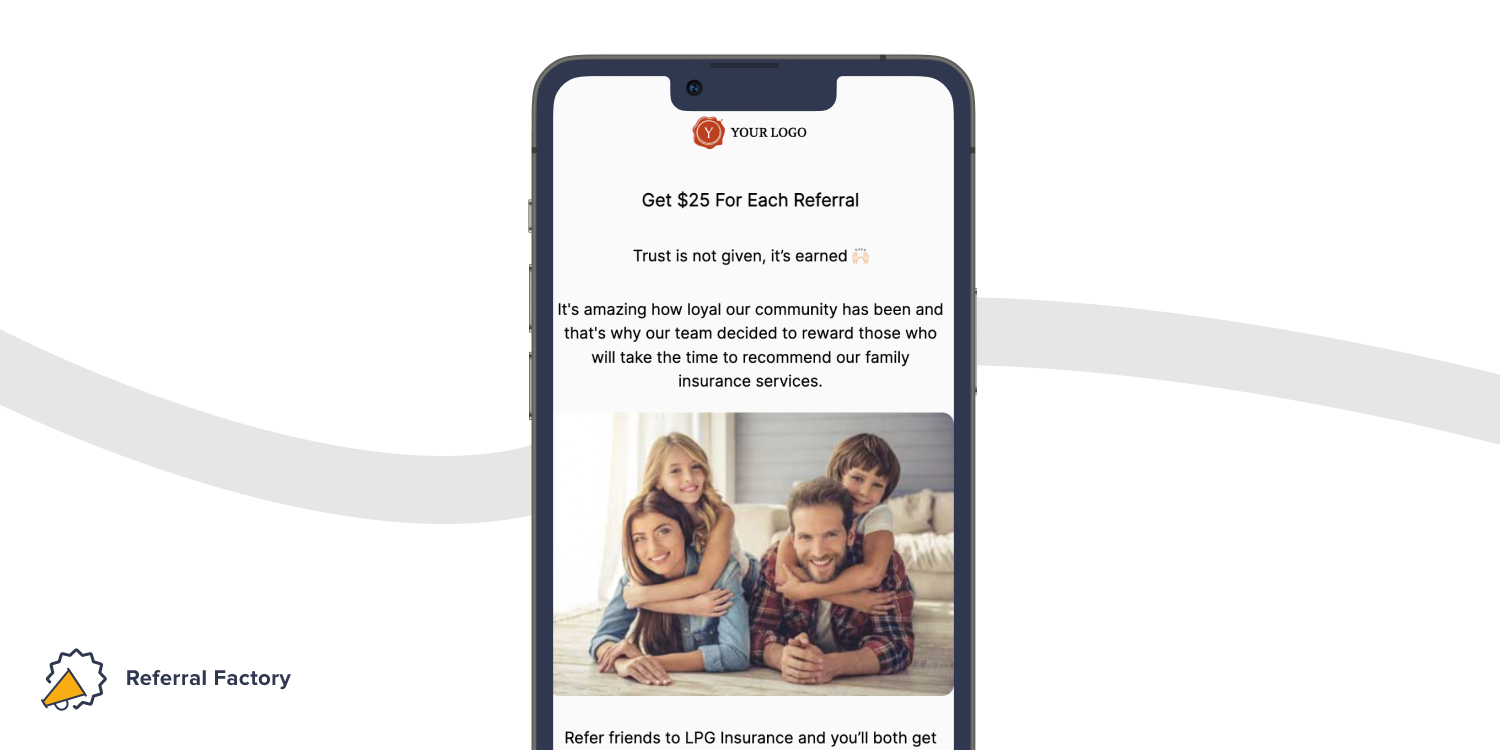
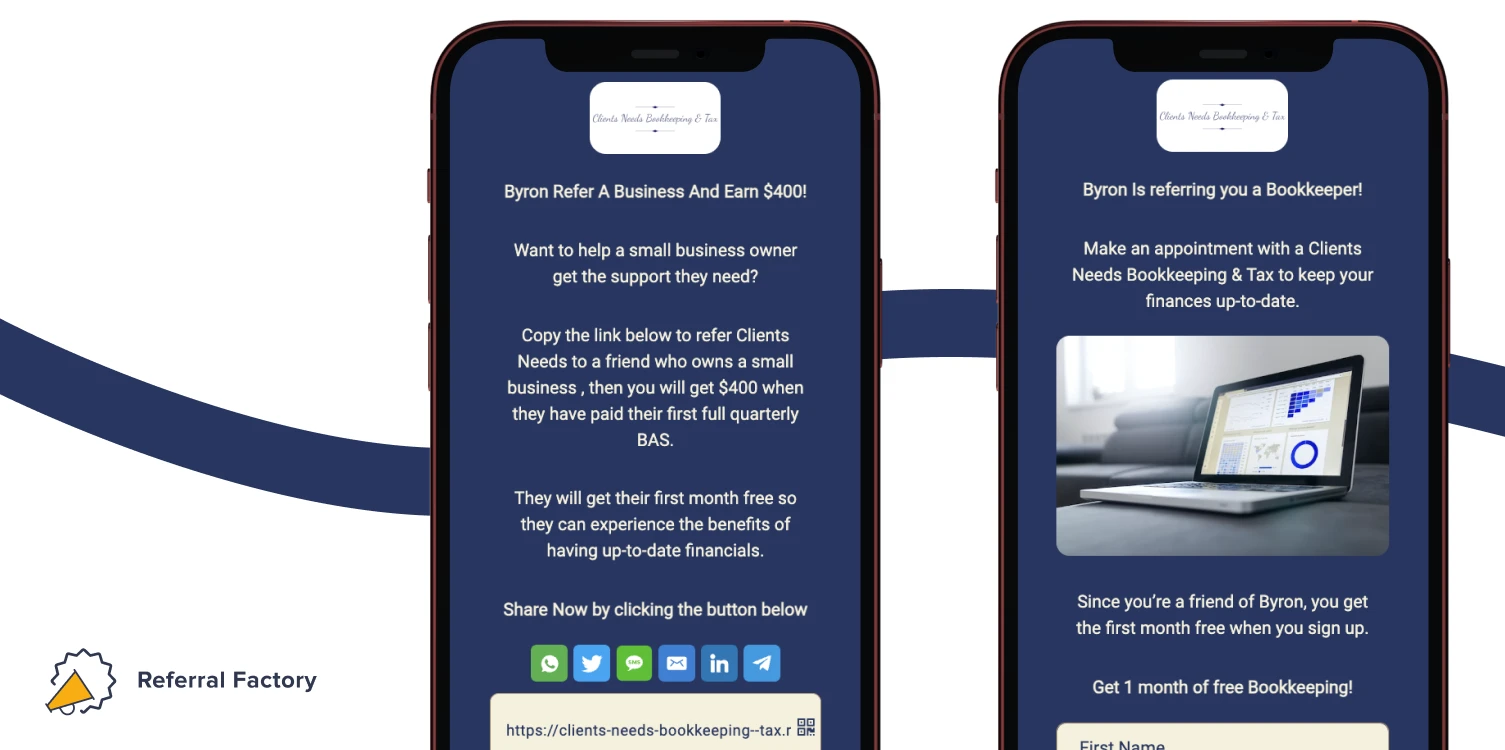
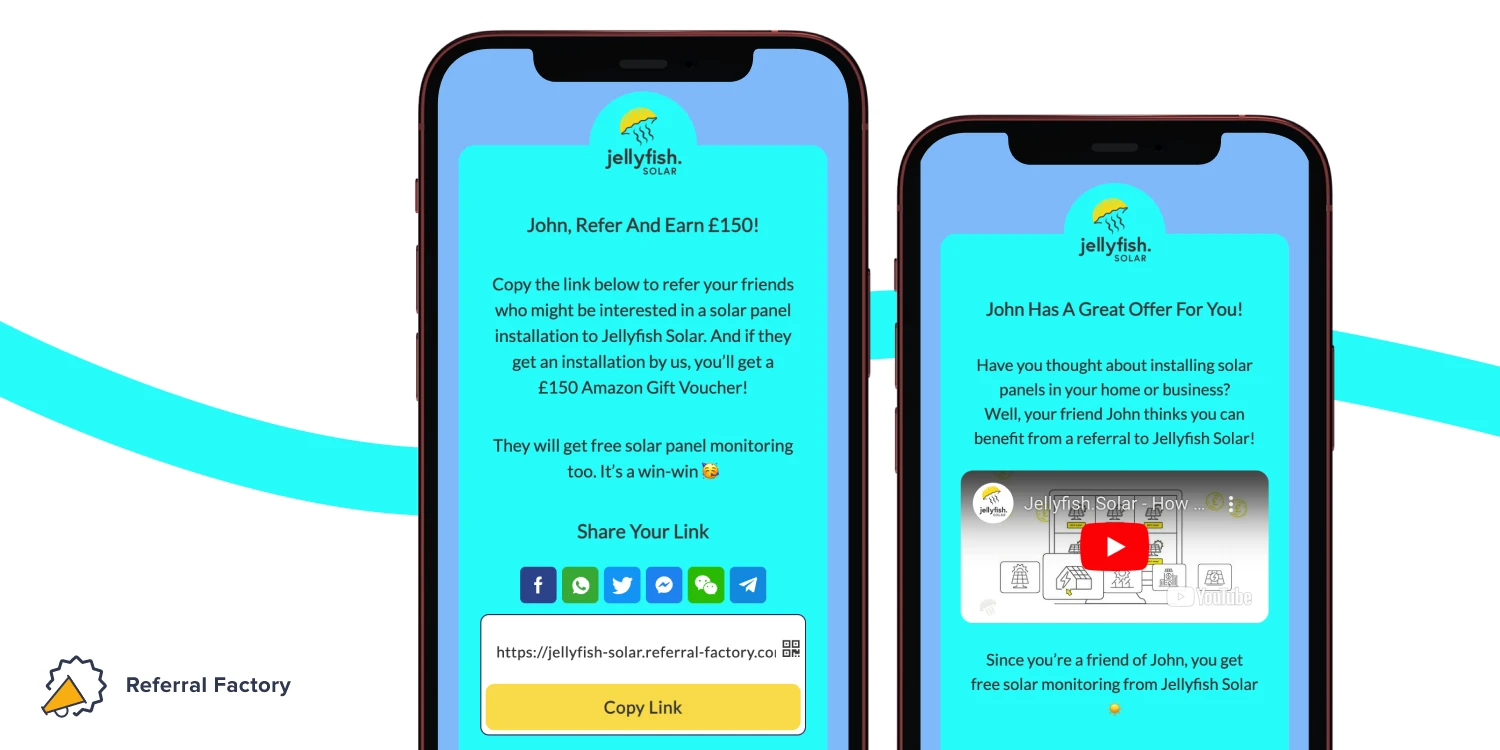
Table of Contents
What Are Business Referrals?
Business referrals are recommendations or suggestions made by one individual or business to another, endorsing the products or services of a particular business.
These recommendations are typically based on the referrer’s positive experiences with the business or a belief in the quality of its offerings.
How Do I Build a Referral Program?
Building a referral program requires careful planning and execution. You can use a referral program template to get up and running quicker, but you’ll still have to adapt it to suit your business brand and needs.
Here are some steps to help you get started:
1. Define your goals: Before you build a referral program, you need to know what you want to achieve. Are you looking to get more demos booked? More incoming leads? Or should more attendees attend your networking event? Once you have a clear idea of your goals, you can design a program that aligns with them.
2. Choose the proper reward for your referral program: Rewards are vital to any referral program. It’s your way to thank your customers for referring new business your way. They can be discounts, vouchers, freebies, or exclusive access to events, products, or services. Ensure your incentives appeal enough to motivate customers to refer their friends and networks.
3. Choose a killer offer for your referral program: The incentive for the invitee (person invited) is something that can make or break your campaign. If there is a great incentive, the person referring will be more motivated to refer friends because they feel more like they are giving their friends something rather than selling your business products or services. “Get a free bottle of wine if you book through my link.” – Do you see how that makes the person referring look like a hero? The incentive is also a great motivation to push the person invited actually to take action based on their friend’s recommendation.
4. Develop a referral process: Make it easy for your customers to refer their friends and family by creating a simple and user-friendly process. Use plug-and-play referral software to execute this if you need access to a permanent development team.
5. Promote your program: Once you have a referral program in place, you must promote it to your customers. Use email marketing, website widgets, social promotions, and other marketing channels to spread the word about your referral program.
6. Provide tracking and transparency: To instill trust and transparency in your referral program, implement a tracking system that allows participants to monitor the progress of their referrals. This tracking can include information about the status of each referral, whether it has been accepted or completed, and the rewards earned.
7. Optimize for mobile users: Ensure your referral program is easily accessible and functional on mobile devices. Many customers use smartphones for online activities, so having a mobile-friendly referral process increases the likelihood of participation. Optimize referral forms, tracking interfaces, and promotional materials for mobile users to create a seamless experience and encourage more referrals from individuals using various devices.
By following these steps, you’ll be able to create a referral program that your customers love – it will also align with your business goals and help you achieve greater success in the long run.
Famous Examples of Referral Programs
The poster child for referral marketing is Dropbox.
Dropbox is an online document storage platform. Their product is storage space. The more space you need, the more you’ll need to pay. Unless, of course, you refer your friend.
Dropbox had a simple referral marketing program: refer a friend, and you get 500 MB of storage free per friend! Plus, your friend also gets 500 MB free.
This is a 2-side referral program (which is more expensive but ultimately better for your customer base). Using this method, Dropbox grew its customer base by 3900% in 15 months. That’s unheard of!
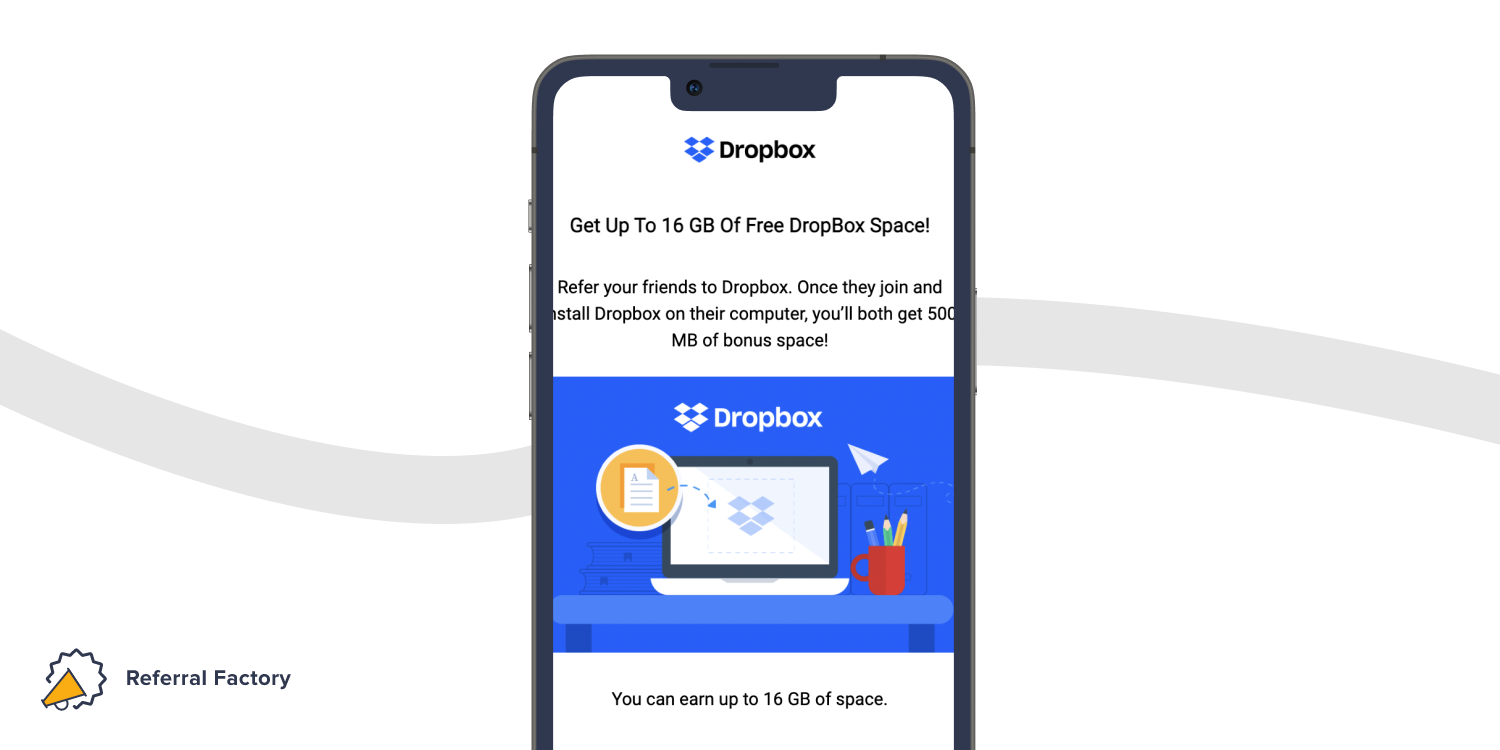
How about PayPal?
PayPal is another solid example of real-world referral marketing. When PayPal got started, they simply gave people cash for opening an account.
And when the new customer referred a friend, they got more cash. How much cash? Originally, it was $20 per friend.
This got pretty expensive, so PayPal phased it down to $5 per referral and ultimately spent $70 million on this program. That’s not chump change!
But, Paypal saw 10% growth per day during the heyday of this program, growing from 1 million to 5 million customers in a matter of months.
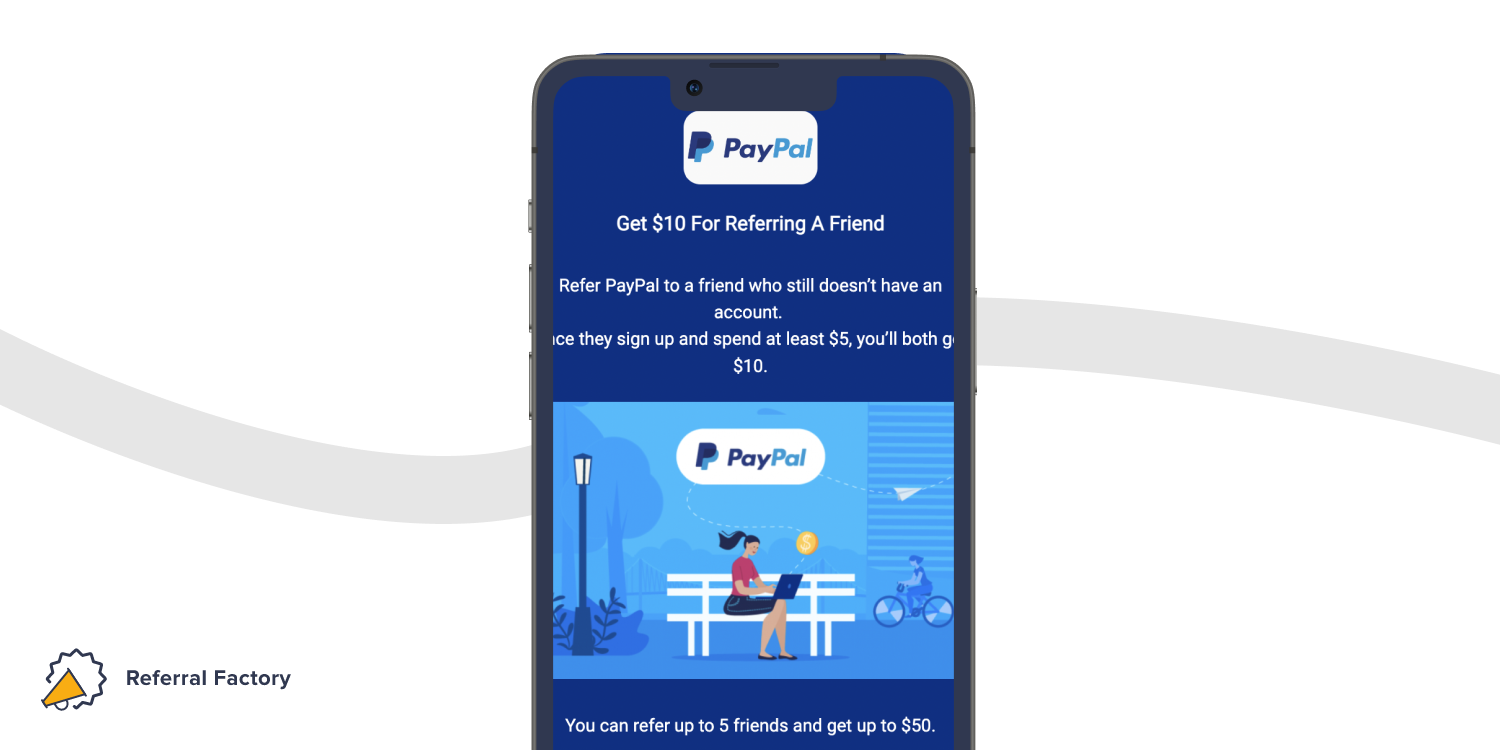
Uber also drove customer growth through referrals: Free rides for two
Uber’s referral program is simple yet effective. Each existing user gets a referral code. They can give that code away to anyone.
When someone creates a new account and uses their friend’s code, both users get their next ride free. This is another very effective 2-side referral (see a pattern?) that has helped Uber really corner the rideshare market.
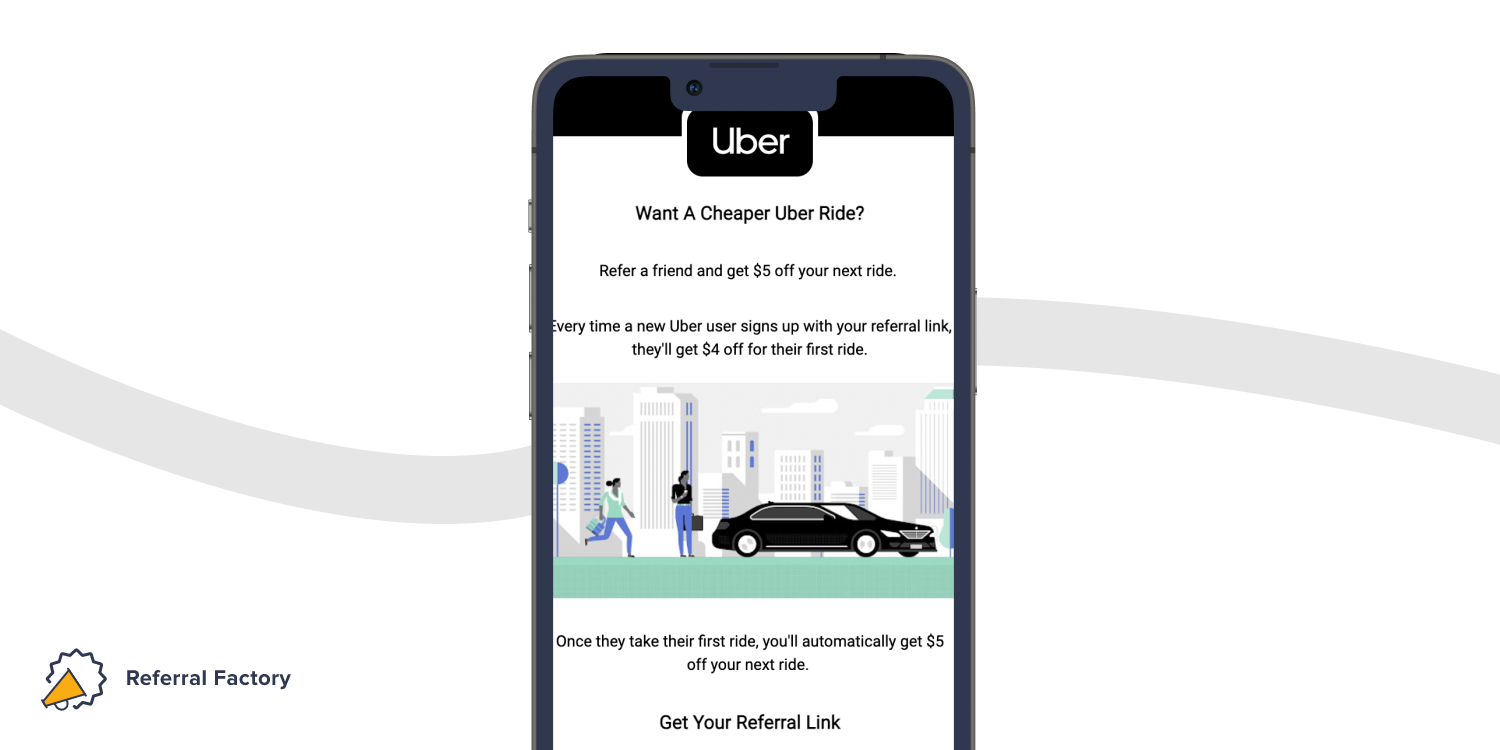
Real-World Examples of Referral Programs
Great news. Referral marketing is great for every business, not just tech unicorns 🦄
Bombas, the hip sock company (full disclosure: I love my Bombas socks), has a slick referral program where an existing customer shares Bombas on social media.
When their friend clicks the link, the friend gets 25% off their Bombas order. Then, the original customer gets $20 to spend on new socks!
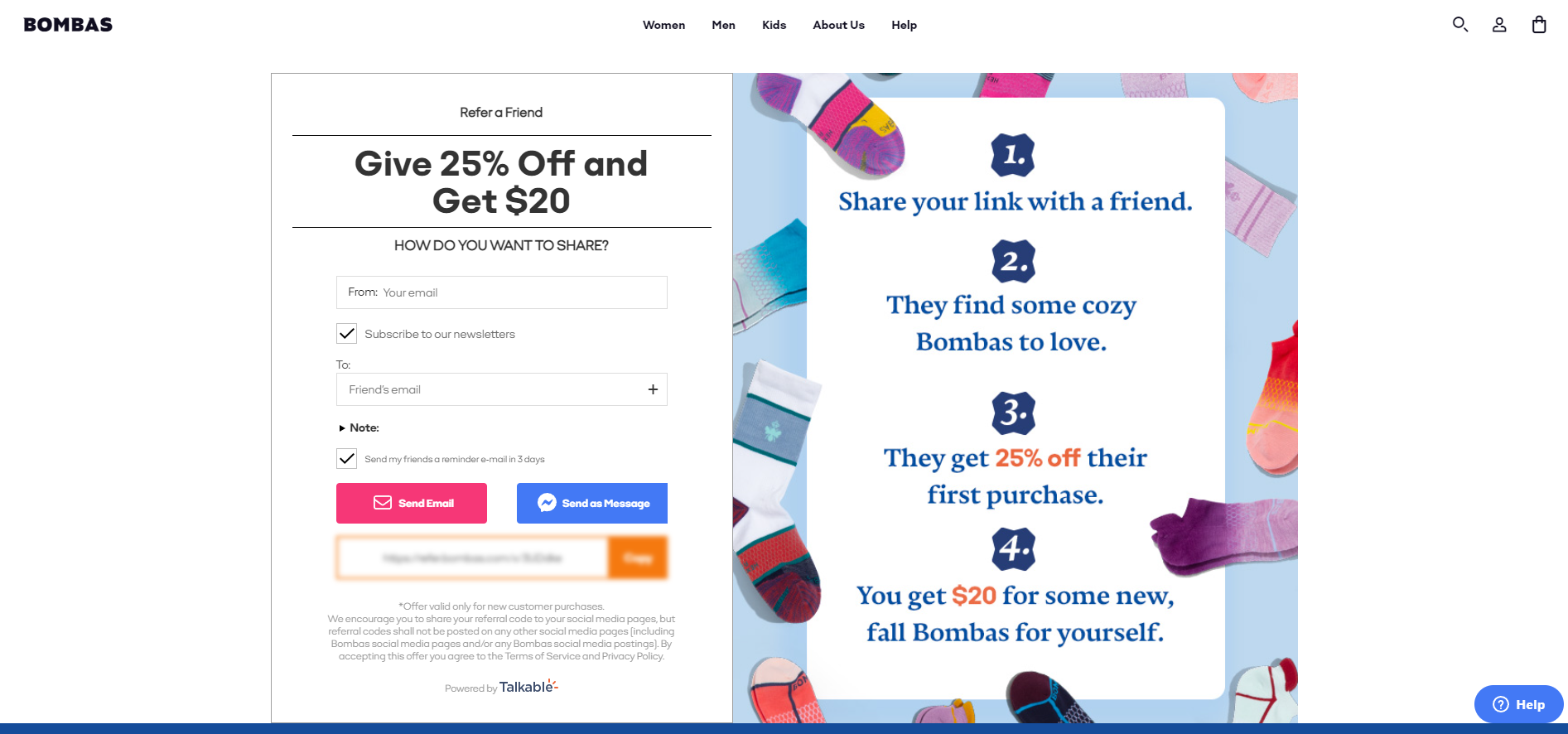
Meal Kit businesses like HelloFresh and Blueapron have also used this 2-side referral strategy, offering discounts on new customer purchases and rewarding their existing customer base for successful referrals.
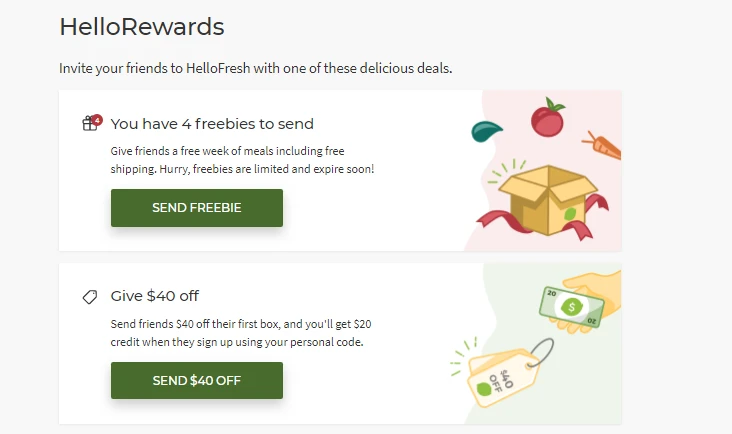
Wine Butler is a wine farm and distribution company based out of Australia. They asked their loyal customers to share their wine recommendations with friends and managed to grow their community of wine connoisseurs and customers.
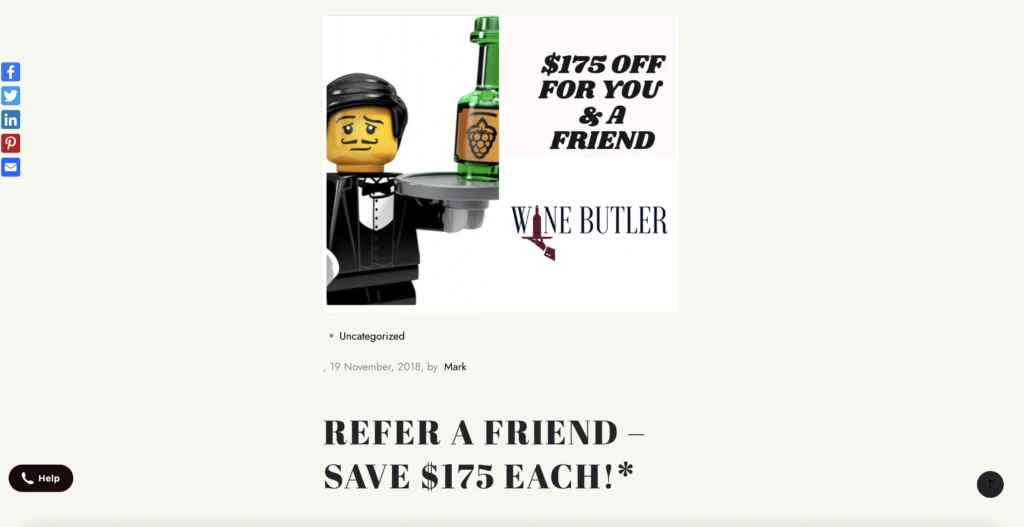
How Can I Measure the Impact of a Referral Program on My Business?
Referral programs can be a powerful way to grow your business while keeping your marketing costs low. However, measuring the impact of a referral program can be challenging but not impossible. If you use plug-and-play referral software, you should be able to get referral tracking like this out of the box 👇
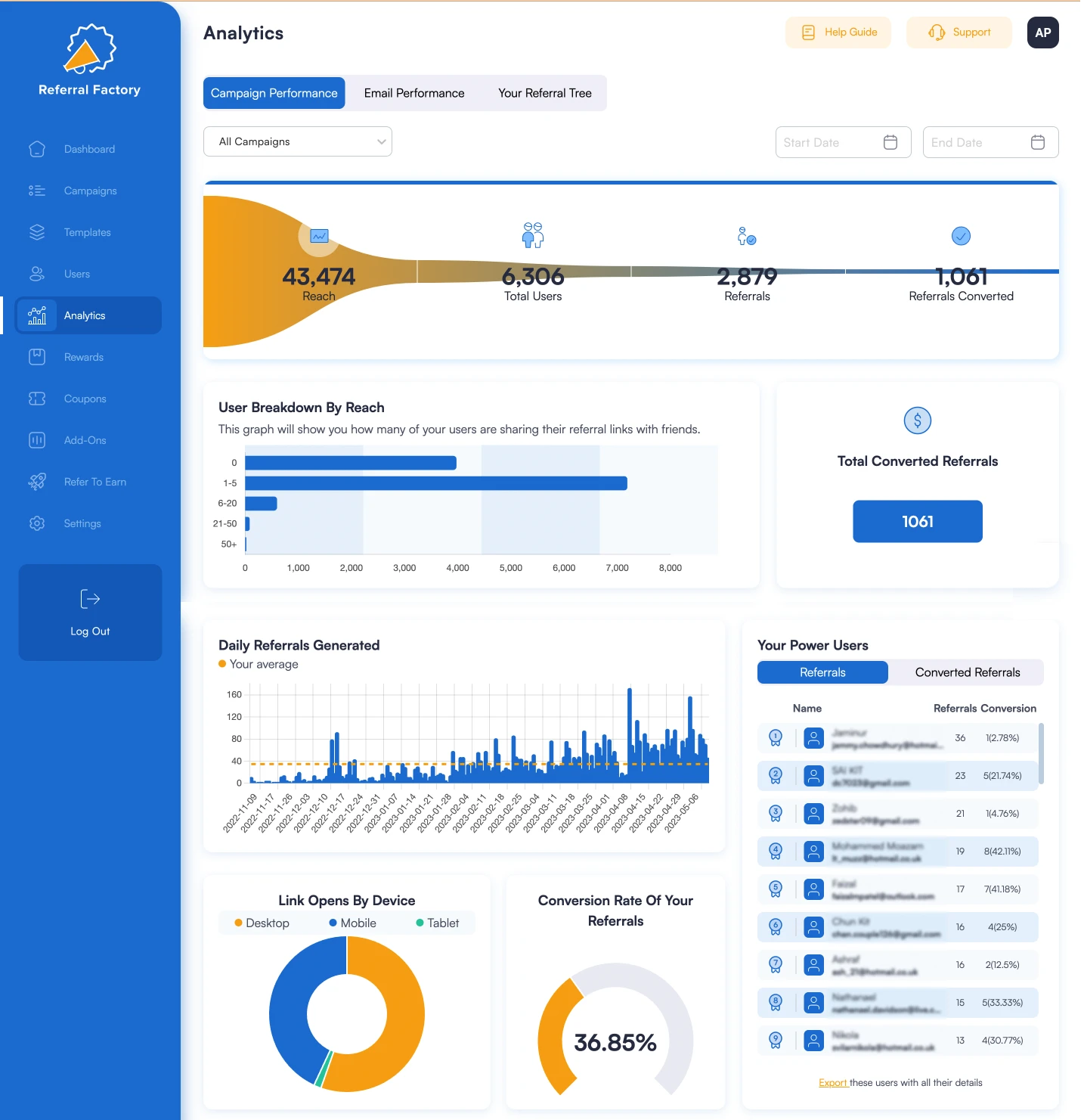
Here are some key metrics that can help you measure the impact of your referral program on your business. You should look for this in your referral software analytics section.
1. Conversion Rate of Your Referrals
The referral conversion rate is the percentage of referrals that turn into paying customers. This metric can help you determine the effectiveness of your referral program in attracting new high-quality leads; the more leads that are referred to you that convert, the higher your conversion rate will be. To calculate this, divide the number of referred customers who made a purchase by the total number of referrals generated. This conversion rate should be around 2x the conversion rate of the leads you acquire through other online marketing channels.
2. Customer Acquisition Cost
In most cases, your overall acquisition should drop over time as your referral program grows. This is because your referral program generates buzz and awareness about your brand in the network of your customers and prospects. This means you’ll get more free organic leads, and your CPA should decrease over time.
3. Customer Lifetime Value (CLV)
CLV is a metric that measures the total revenue a customer generates for your business over time. A strong referral program can increase customer retention rates and bring you customers who spend more, leading to higher CLV. To calculate CLV, multiply the average purchase value by the average purchase frequency and multiply that by the average customer lifespan.
4. Customer Feedback and Reviews
Ask your customers to review your referral offering and give you feedback on how you can improve. The more you align your program with your customer values (and your own), the more likely you are to attract the right kind of buyers to your business.
By measuring the impact of your customer referral program using metrics such as referral conversion rate or customer lifetime value, you’ll have all the data you need to optimize your campaign over time.
You’ll want to keep the referrals flowing into your sales pipeline, so keep a close eye on your referral analytics and make sure you adapt the strategy monthly based on feedback and data.
How Can I Increase Referrals From Existing Customers?
Referral marketing has been one of the most effective marketing strategies for businesses of all sizes.
Customer referrals are considered to be one of the most trusted forms of advertising as they come from people who have already experienced your products or services and are satisfied enough to refer them to others.
Here are some ways to increase referrals from existing customers:
Provide Excellent Customer Service
Customers tend to refer businesses that provide them with exceptional service. Ensuring that your customers are satisfied with your products and services will help to increase the chances of them referring your business to others.
Make the Referral Process Easy
Make it easy for your customers to refer your business to others. Set up a referral program that provides incentives for both the customer and the referred person. Offer discounts, free services, or other rewards for successful referrals.
Ask for Referrals
Don’t be afraid to ask your customers for referrals. They may not think of referring your business unless you ask them to. You can ask for referrals through email, social media, or even in person.
Stay in Touch with Customers
Keep your existing customers engaged by staying in touch with them through regular newsletters, updates, or special offers. By maintaining regular communication, you can keep your business at the top of your mind and increase the chances of referrals.
Create Shareable Content
Develop content that is easily shareable across various platforms. This could include engaging social media posts, informative blog articles, or visually appealing images. Encourage your existing customers to share this content with their networks, subtly incorporating your products or services.
Personalize the Referral Request
When asking for referrals, personalize your requests based on your relationship with each customer. Tailor your communication to highlight specific aspects of your products or services that align with their preferences or previous positive experiences. A personalized request shows that you value their individual experiences and increases the likelihood of them sharing your business with others.
Monitor and Measure your Referrals
Keep track of your referrals and measure the success of your referral program. This will help you identify areas where you can improve and make necessary changes to increase the number of referrals you receive. By monitoring your referrals, you can also identify your top referrers and reward them for their efforts.
Implementing a referral program can be a game-changer for your business. By encouraging your customers to refer new business to you, you can increase your customer base and sales while also building loyalty and trust with your existing customers. By providing exceptional customer service, making the referral process easy, asking for referrals, staying in touch with customers, and monitoring your referrals, you can create a successful referral program that benefits both your business and your customers.
How Can You Get Started?
Getting started with referral marketing is much easier than you think. You don’t need a developer or a growth hacker; you just need an existing customer base that uses and loves your brand.
If you have that, you can get referral programs for businesses off the ground in just a few minutes using plug-and-play referral software. Below, we’ve included a breakdown of the top referral software on the market right now, ranked by their rating and online reviews across trusted sites like Capterra and G2. This shows what tools are currently trending with real businesses just like yours.
Referral Factory ranks top with an average rating of 4.87 across the board, this average from more than 300 customer reviews across various independent review sites. These are the features you’ll get on the entry-level Referral Factory plan:
- Simple referral program software that you can use to build and track a fully customized referral program without writing a line of code.
- Access to 100+ referral program templates designed by marketing experts. We have templates for most industries, and they are free to use on all plans.
- Access to 200+ referral rewards and incentives like vouchers and digital cash cards. The ability to issue your own rewards manually, through webhooks, or through Zapier. Our referral software helps you automate the issuing of rewards.
- Installing referral widgets, pop-ups, embeds, and pages to promote your referral program and get referrals is easy.
- You can use our referral software to sync your CRM contacts to automate asking your HubSpot, Pipedrive, Intercom, Zoho, or Salesforce contacts to refer friends. Or connect any CRM through Zapier.
- Advanced referral analytics to track everything from your top referrers to the channels your users are sharing each referral link on.
- Free onboarding and a great support team that are experts on both referral marketing and influencer marketing.
What Are the Benefits of Referral Marketing?
Cost-effectiveness: Referral marketing is often more cost-effective than traditional advertising or marketing methods. Since referrals primarily rely on the recommendations of existing customers or contacts, the costs associated with acquiring new customers through referrals can be significantly lower than other customer acquisition strategies.
Higher conversion rates: Referred customers tend to have higher conversion rates compared to leads from other sources. This is because the recommendation comes from a trusted source, and individuals are more likely to engage with a business when it’s been personally endorsed by someone they know or respect.
Increased customer loyalty: Referral marketing not only helps in acquiring new customers but also plays a role in fostering customer loyalty. Existing customers who refer others are likely to feel a stronger connection to the business and may become more loyal over time.
Better quality leads: Referred leads often result in higher-quality customers. Since referrals are typically based on shared interests, needs, or experiences, the referred individuals are more likely to be a good fit for the products or services offered by the business.
Improved brand reputation: Positive word-of-mouth generated through referrals contributes to an enhanced brand reputation. When people hear positive things about a business from friends, family, or colleagues, it builds trust and credibility, strengthening the overall perception of the brand.
Greater customer engagement: Referral marketing encourages customer engagement by involving existing customers in the growth of the business. Customers who actively participate in referral programs or recommend a business to others are likely to feel a stronger sense of engagement and connection with the brand.
Why Do Some Businesses Still Overlook the Importance of Referral Programs?
Perhaps it’s because they believe that word-of-mouth marketing is not a controllable or measurable marketing strategy.
However, this couldn’t be further from the truth. In fact, referral programs are one of the most effective and low-cost ways to generate new business.
Not only do referrals have a higher conversion rate, but they also result in higher retention rates. According to a study by the Wharton School of Business, the lifetime customer value of a referred customer is 25% higher than that of a non-referred customer. You can find more referral marketing statistics here.
Furthermore, referral programs are a great way for your business to build brand credibility and trust.
When a friend or family member recommends your business to their network, it’s perceived as a personal endorsement.
This endorsement can go a long way in convincing potential customers to choose your business over your competitors.
Additionally, and often an overlooked benefit of launching a referral business program, is the fact that doing so can help your business identify your most loyal customers.
These customers can then be rewarded for their loyalty, which can further enhance their loyalty and increase the likelihood of them referring more friends and family to your business.
We truly believe that the businesses overlooking this powerful marketing channel are doing so because they don’t understand how valuable it can be, and also, they don’t know there are plug-and-play tools to help them bring a referral program to life without having to hire any developers.
Conclusion
A referral program thrives on contented customers who willingly advocate for your business.
Exceptional customer experiences fuel recommendations, making satisfied clients the backbone of successful referral marketing.
Armed with our insights, remember to consistently provide exceptional customer service, turning each customer interaction into an opportunity for positive endorsement.
Share our business referrals guide with friends to spread the knowledge.
FAQs
What are the 4 types of referrals?
Referrals come in the form of word-of-mouth, online reviews, social media sharing, and email recommendations.
How do business referrals work?
Business referrals involve satisfied customers or contacts recommending a business, often supported by referral programs and incentives.
What businesses need referrals?
While beneficial for all businesses, referrals are particularly crucial for service-oriented, small, startup, or niche businesses, as well as those in competitive markets.
How do I get professional referrals?
Establish strong professional connections through networking, industry participation, and showcasing expertise to encourage colleagues and clients to provide referrals.
Follow @referralfctry
